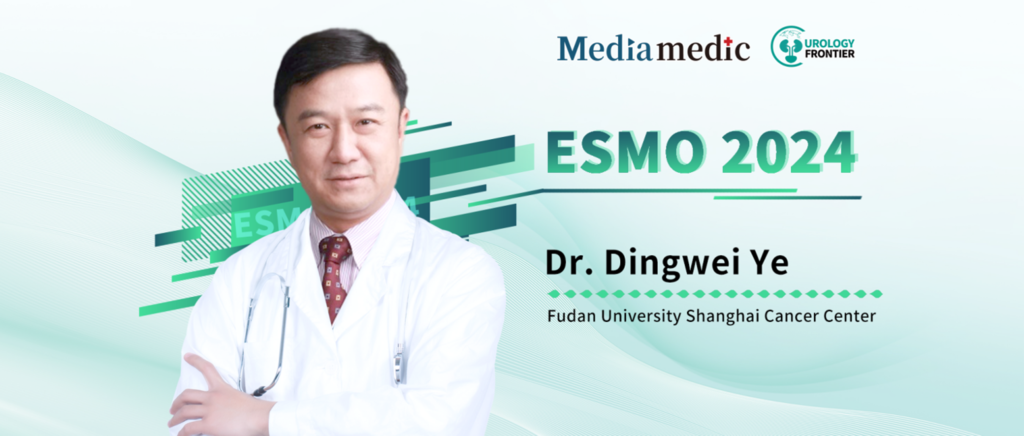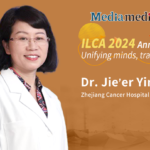
Editor's Note: The 2024 European Society for Medical Oncology (ESMO) Congress was held from September 13 to 17 in Barcelona, Spain. During the event, multiple key studies in urologic oncology were highlighted. Dr. Dingwei Ye from Fudan University Shanghai Cancer Center presented preliminary findings on the safety, tolerability, and efficacy of BL-B01D1, a novel EGFR/HER3 dual-targeting antibody-drug conjugate (ADC), in patients with previously treated metastatic urothelial carcinoma (UC), garnering considerable attention. Urology Frontier invited Dr. Dingwei Ye to share major developments in urologic oncology from the congress, discuss new dual-targeted therapies for advanced UC, and highlight the Fudan University Shanghai Cancer Center’s progress in this area.01 Urology Frontier: During this year’s ESMO Congress, many studies in urologic oncology were featured. Which research stood out to you?
Dr. Dingwei Ye: This ESMO Congress had numerous highlights in urologic oncology, particularly in kidney, bladder, and prostate cancers. The field of renal cancer showed robust findings in first-line treatments, and for bladder cancer (urothelial carcinoma), ADCs continued to be a focal point. Specifically, the phase II study data on the EGFR/HER3 dual-target ADC, BL-B01D1 (1959O), caught widespread attention.
In prostate cancer, the EORTC-GUCG 1333/PEACE-3 study (LBA1) was particularly notable. This randomized, multicenter, open-label phase III study evaluated the efficacy of combining radium-223 with enzalutamide versus enzalutamide alone in asymptomatic or mildly symptomatic bone metastatic castration-resistant prostate cancer (mCRPC) patients. Results showed significant improvements in both radiographic progression-free survival (rPFS) and overall survival (OS) in the combination group, offering a new approach for first-line treatment of mCRPC by enhancing outcomes through combining radionuclides with standard therapies.
02 Urology Frontier:The PEACE 3 study proposed radium-223 combined with enzalutamide as a new regimen for bone metastatic prostate cancer. What are your thoughts on these findings?
Dr. Dingwei Ye: Traditional first-line mCRPC treatments, such as androgen receptor inhibitors like enzalutamide or abiraterone, though effective, often fall short in achieving the desired rPFS and OS as monotherapies. The PEACE 3 study innovatively introduced the radionuclide radium-223 alongside standard treatment with enzalutamide. This combination significantly extended both rPFS and OS, delivering promising results. This finding not only demonstrates the potential of radionuclides in mCRPC treatment but also opens the door to considering their use earlier in the treatment cycle, such as in the hormone-sensitive stage or as part of neoadjuvant or adjuvant therapy. This study may well change clinical guidelines for first-line treatment of mCRPC.
03 Urology Frontier: At ESMO, you shared the latest research on the novel dual-antibody BL-B01D1 for advanced UC. Could you discuss its therapeutic efficacy?
Dr. Dingwei Ye: BL-B01D1 is an innovative EGFR x HER3 bispecific antibody ADC, and our study focused on its safety and efficacy in urothelial carcinoma. Through our phase Ib/II study, we observed encouraging antitumor activity in patients with locally advanced or metastatic UC. The confirmed objective response rate (cORR) was 33.3%, with a six-month PFS rate of 62.4%. For patients receiving second-line treatment (having received prior chemotherapy), the results were even more remarkable, with a cORR of 75% and a six-month PFS rate of 100%. In terms of safety, BL-B01D1 was well-tolerated, with no treatment-related deaths, and most side effects were manageable hematological toxicities. Non-hematological toxicity rates were low and mild, with no cases of interstitial lung disease (ILD). These findings suggest that BL-B01D1 offers manageable safety and significant antitumor efficacy in pre-treated UC patients, and we plan to conduct further pivotal studies to validate these results.
04 Urology Frontier: Looking forward, what research directions will you and your team pursue in urologic oncology to further improve patient outcomes in China?
Dr. Dingwei Ye: The urologic oncology team at Fudan University Shanghai Cancer Center will focus on four key areas. First, we aim to further elevate surgical standards and increase surgical volume in kidney, bladder, and prostate cancers, maintaining our leadership in these fields. Second, we will strengthen our MDT (multidisciplinary team) to provide personalized treatment plans for patients with intermediate or advanced urologic cancers, improving overall survival and cure rates. Third, we will deepen our translational research efforts, utilizing graduate, doctoral, and post-doctoral teams to identify biomarkers predictive of treatment efficacy, supporting precision medicine. Lastly, and most importantly, we will increase clinical trials of new drugs and devices, offering patients more effective treatment options and hope for better outcomes.
Dr. Dingwei Ye
Vice President of Fudan University Shanghai Cancer Center, Chief Expert of Urological Tumor MDT
Director of Shanghai Urological Tumor Research Institute
Director of Fudan University Prostate Cancer Research Institute
Director of the Male Reproductive System Tumor Committee of the Chinese Anti-Cancer Association (CACA-GO)
Director of the Prostate Cancer Expert Committee of the Chinese Society of Clinical Oncology (CSCO)
Director of the Urology Committee of the China Primary Health Care Foundation Former Director of the Urological Male Reproductive System Tumor Committee of the Chinese Anti-Cancer Association (CACA-GU)
Deputy Director of the Oncology Group of the Urology Branch of the Chinese Medical Association (CUA), Director of CPCC
Deputy Director of the Urothelial Cancer Expert Committee of the Chinese Society of Clinical Oncology (CSCO)
Deputy Director of the Renal Cancer Expert Committee of the Chinese Society of Clinical Oncology (CSCO)
Deputy Director of the Immunotherapy Expert Committee of the Chinese Society of Clinical Oncology (CSCO)
Director of the Urological Tumor Collaborative Group of Chinese Tumor Hospitals (UCOG)
Executive Director of the Chinese Anti-Cancer Association, Executive Director of the Chinese Society of Clinical Oncology
Deputy Editor-in-Chief of the Chinese Journal of Oncology Member of the NCCN Prostate Cancer, Renal Cancer, Bladder Cancer Asian Consensus Expert Committee
Member of the Advanced Prostate Cancer St. Gallen Consensus Expert Committee
Director of the Urological Tumor Committee of the Shanghai Anti-Cancer Association
Vice President of the Urology Physician Branch of the Shanghai Medical Association
Immediate Past President of the Asia-Pacific Prostate Society (APPS) Vice President of the Asia-Pacific Society for Cryosurgery


